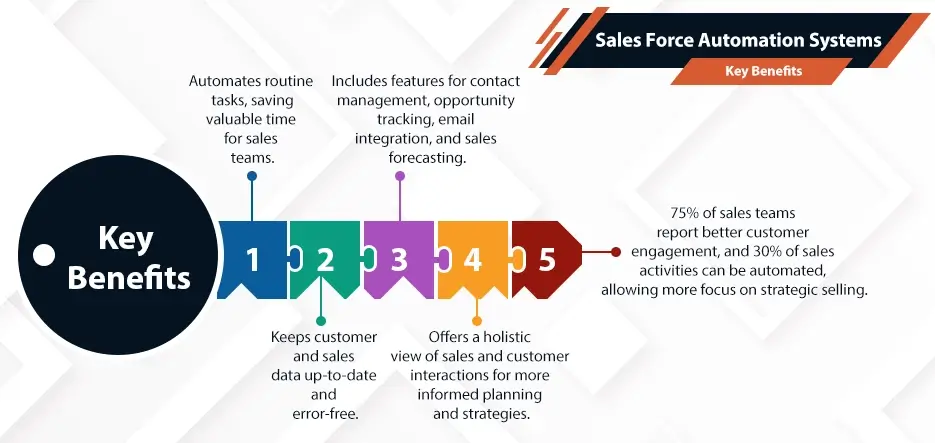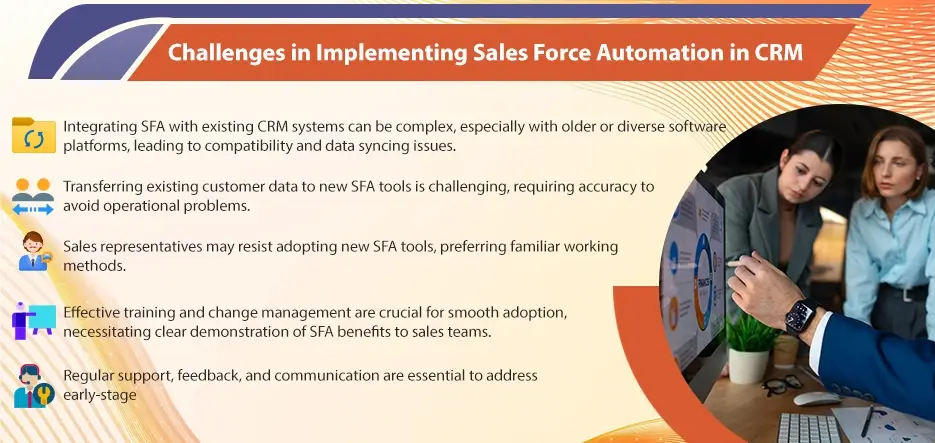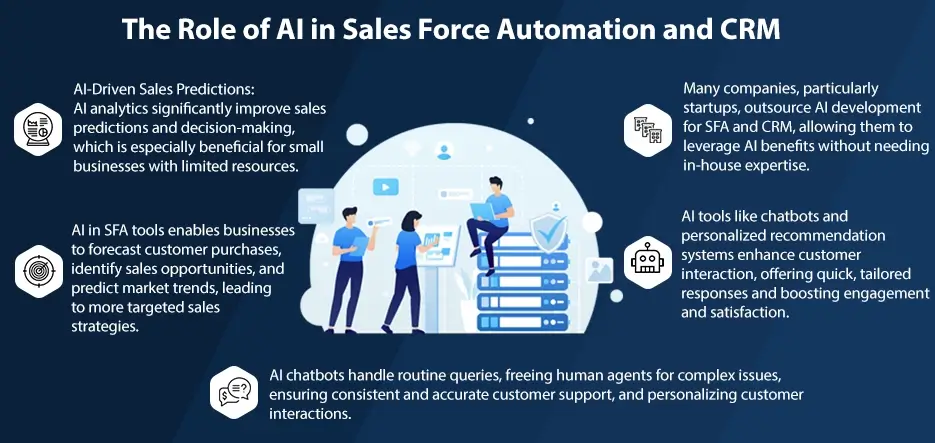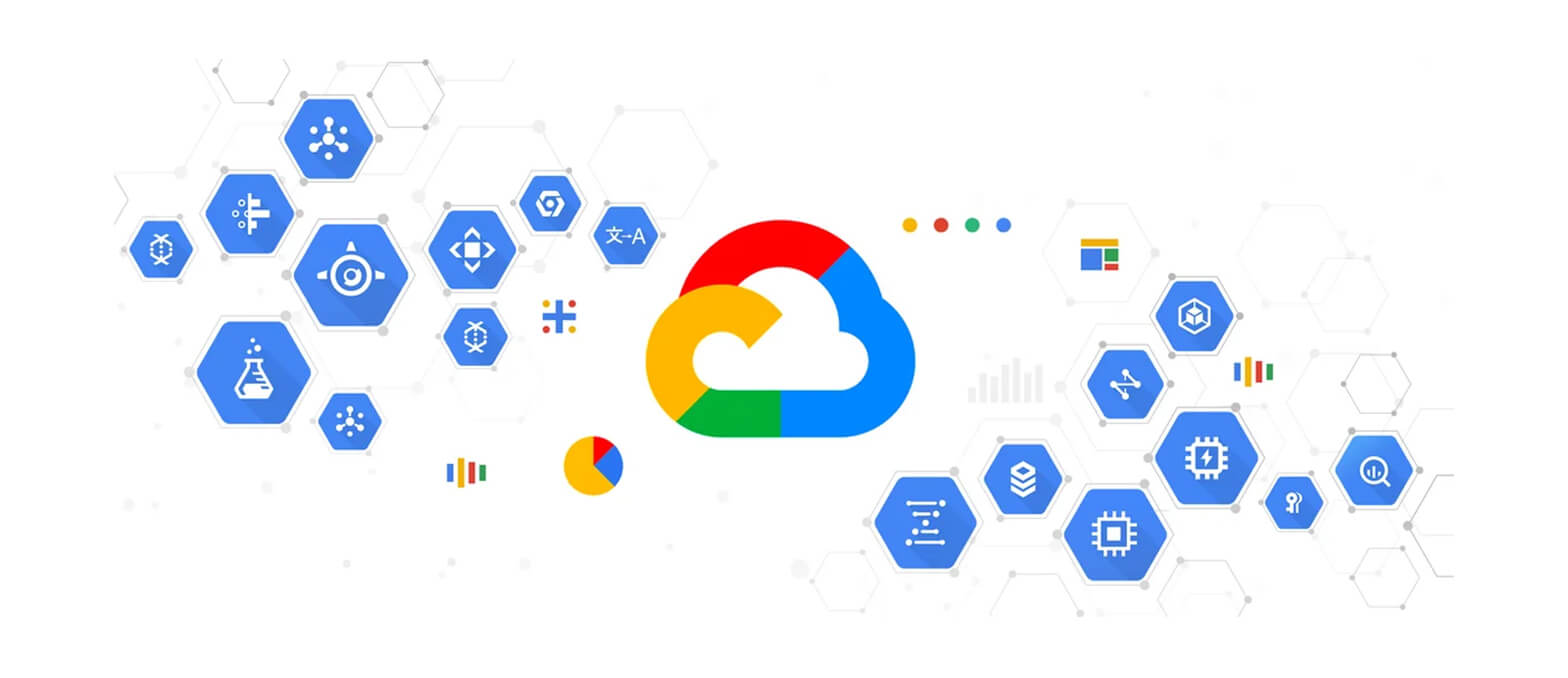Table of Contents
Sales force automation systems are great for cutting down repetitive work. This saves time and keeps the data about customers and sales accurate. The Sales Force Automation software usually has tools for managing contacts, tracking opportunities, integrating emails, and predicting sales. These tools give a complete view of sales and customer interactions. This helps sales teams make better decisions and plans. 75% of sales teams said customer engagement improved after using sales force automation in CRM. 30% of sales activities can be automated, reducing time spent on admin tasks and letting salespeople focus more on strategic selling.

A Brief History of Sales Force Automation
Sales force automation started in the 1980s with database marketing. This early stage was about managing customer data efficiently.
The 1990s brought big changes with Customer Relationship Management (CRM) software. This moved from just storing data to doing more complex things like tracking leads and automating processes. Adding sales force automation in CRM systems changed how businesses managed sales and customers. It led to better sales strategies and customer experiences.
The 2000s saw a rise in cloud computing and mobile technology. Custom Salesforce Development gave more flexibility. Salespeople could access important data from anywhere, which boosted productivity. They could update and get information quickly, leading to better decisions.
Artificial intelligence Development (AI) and machine learning have recently improved sales force automation. These technologies have improved SFA tools by providing predictive analytics, automated lead scoring, and personalized customer interactions. AI in sales force automation has streamlined processes and given deeper insights into customer behaviors and preferences.
In conclusion, automation has evolved a lot. It started with managing customer data and now uses AI for analytics. SFA has changed the sales world a lot.
What is CRM and Why It Matters
Customer Relationship Management (CRM) is vital in modern business. It’s about managing relationships with current and future customers. CRM is a strategy for understanding customers’ needs and improving relationships, which can lead to more sales and better efficiency. A key part of Custom CRM Development is creating detailed customer profiles to provide personalized services and communication.
CRM’s importance is huge. It’s more than software; it’s a business strategy that helps companies connect with customers, smooth processes, and increase profits. When businesses understand and meet customer needs, they build trust. This trust turns into customer loyalty and more sales.
CRM systems gather information from websites, phones, emails, live chats, marketing materials, and social media. By knowing a customer’s history with the company, staff can better meet their needs and predict future interactions. This method is efficient and gives customers a more personalized experience.
Evolution of CRM in the Business World
CRM has changed a lot over time. Initially, it was about keeping customer databases. The focus was on recording contacts for sales teams. But this was basic and only offered simple data storage.
The big change in CRM came with technology. With the internet and e-commerce, businesses saw the need to manage customer relationships digitally. This led to advanced CRM software that stored customer info and tracked interactions and buying habits.
The early 2000s brought cloud-based CRM systems. These let all businesses manage customer relationships without needing in-house hardware or software. This made powerful tools available to smaller businesses, not just big ones.
Custom enterprise software development is also key in enhancing CRM systems. It lets businesses customize CRM software to their needs, aligning better with their processes and goals.
Revolutionize Your CRM Strategy: Embrace Sales Force Automation for Unparalleled Impact!
How does Sales Force Automation Integrates with CRM Systems
Sales Force Automation (SFA) is a tool designed to automate sales tasks. It helps in tasks like tracking leads and sales forecasting within CRM. When SFA and CRM systems work together, they create a strong setup that improves sales and customer management.
This connection is important for many reasons. It gives a single place for sales teams to see and manage customer info and sales tasks. All customer talks, like phone calls, emails, or meetings, are recorded in one system. This lets sales reps see everything about a customer, leading to better and more personal sales plans.
SFA Sales Force Automation systems often have advanced analytics. When combined with CRM, these tools give insights into sales trends, customer behavior, and market changes. This helps companies refine their sales plans and predict future trends better.
The Synergy Between Sales Automation and CRM
The synergy between sales automation and CRM is key for businesses. It’s not just having two strong systems; it’s how they work together. They give a full view of the sales process and customer journey. This is important for businesses wanting to better their sales methods and customer relationships.
One big plus of this synergy is better customer engagement. With detailed customer data, sales teams can tailor their communication to fit each customer’s needs and likes. This personal touch often leads to happier customers and loyalty.
Also, outsourcing Salesforce development adds to this synergy. It lets businesses customize their CRM and SFA systems to fit their needs. Custom solutions ensure CRM and SFA systems work well together, offering functions matching the business’s goals and methods.
In conclusion, merging Salesforce custom development and CRM systems is a smart move that can greatly improve a company’s sales and customer management. The combination leads to a more united, efficient, and data-driven way of handling sales and customers. As businesses look for edges in the market, the role of SFA and CRM becomes more important, leading to more personal, efficient, and effective sales strategies.
Benefits of Sales Force Automation in CRM
Enhancing Customer Data Management
Sales Force Automation (SFA) in Customer Relationship Management (CRM) has changed customer data management. Businesses can handle customer information more effectively by using the best sales force automation software in CRM. They can gather customer details like contact information, communication history, purchase records, and preferences.
This information is crucial. When used right, this information can shape better marketing and sales strategies. This leads to more successful campaigns and higher sales.
Also, SFA improves data accuracy. It automates entering data, which cuts down on human errors. Accuracy is key since even small mistakes in customer data can cause big problems in sales and marketing.
Streamlining Sales Processes
Another big plus of SFA in CRM is making sales tasks easier. Sales teams often juggle many tasks and customer talks. This can be hard and inefficient. Sales force automation software automates regular tasks like setting up meetings, sending emails, and updating sales records. This lets sales reps focus on important things like talking to customers and making sales.
Adding enterprise mobile application development into CRM has also made sales more flexible. Sales reps can use their mobile devices to access customer data and do sales tasks anywhere. This is especially good for salespeople who are often out of the office and need real-time data.
Improved Customer Service and Support
SFA in CRM also makes customer service better. With full customer profiles and history available immediately, support teams can give more personalized help. They can quickly understand a customer’s issue, past talks, and what they like. This lets them offer solutions customers are more likely to be happy with.
Salesforce CRM development is key here. Custom Salesforce solutions ensure customer service teams have what they need to quickly and effectively answer customer questions and solve problems. This quick response not only fixes issues faster but also makes customers’ overall experience better.
In conclusion, adding Sales Force Automation to CRM systems has many benefits. It improves customer data management, simplifies sales tasks, and boosts customer service. SFA is key to making business operations better. As technology grows, SFA and CRM systems will get even more advanced, making sales and customer management more efficient and effective.
Challenges in Implementing Sales Force Automation in CRM
While useful, implementing Sales Force Automation (SFA) in CRM systems has its challenges. These can range from technical issues to training and adoption problems with sales teams. Businesses must understand and tackle these issues to get the most out of SFA.

Technical and Integration Issues
One big challenge with SFA in CRM is handling technical and integration issues. Sales force automation companies offer advanced software that needs to fit well with existing CRM systems. This integration is key but can be complex, especially for businesses with older systems or those using many software platforms.
Issues might include compatibility problems, data syncing errors, and customizing features for specific business needs. This is even more complex with software development services in the USA, where there are many different CRM systems and SFA tools, each with unique features and ways to integrate.
Data migration is also a big part of this challenge. Moving existing customer data between the CRM system and the new SFA tool can be tricky. Keeping data accurate and complete during this move is crucial, as mistakes can cause big operational problems later.
Training and Adoption Among Sales Teams
Another major challenge is getting sales teams to use SFA tools. Sales reps often prefer their usual working methods, and a new system might face resistance. Effective training and change management are essential for smooth adoption.
Training should cover how to use the new system and show the sales team the benefits of SFA. They need to see how these tools can make their work easier and more effective. Without this, adoption might be low, and the full benefits of SFA might not be reached.
Ongoing support and feedback are also key. This helps address any issues or concerns sales teams might have in the early stages. Regular check-ins, additional training, and open communication can help make the transition easier and encourage use.
In conclusion, while Sales Force Automation in CRM systems brings many benefits, it also has challenges that need careful attention. Handling technical and integration issues needs good planning, understanding the existing tech, and choosing the right software services. Training and getting sales teams to use the system requires a well-thought-out strategy with effective training, ongoing support, and showing the new system’s benefits. By facing these challenges, businesses can successfully implement SFA in their CRM systems, leading to better sales efficiency and customer relationships.
Future Trends in Sales Force Automation and CRM
Emerging Technologies and Their Impact
AI and ML are leading this tech revolution. AI-powered sales force automation tools can analyze huge amounts of data for actionable insights, predictive analytics, and personalized customer experiences. AI can predict what customers might buy, suggest products, and automate regular sales tasks, boosting efficiency and effectiveness.
IoT application development is also important. Connected devices let businesses collect real-time data from many places. When added to CRM systems, this data gives a complete picture of customer interactions, leading to more personalized and timely sales methods.
A Custom software development company in the USA can tailor these technologies for specific business needs. This customization lets businesses use technology to fit their sales processes and customer engagement strategies.
Predictions for Future SFA and CRM Integration
Here are some predictions for SFA and CRM:
- More Automation and Efficiency: Future SFA tools will automate more sales tasks, reducing manual work and increasing efficiency. This will cover more than just data entry and extend to customer interaction and engagement.
- Better Personalization: With more advanced SFA tools, businesses can offer personalized customer interactions. These AI systems will provide personalized content and recommendations, improving customer engagement and sales.
- More Mobile and Accessible: Sales force automation tools will be more mobile-friendly. Sales teams will access key data and do important tasks from anywhere, using phones or tablets. This mobility will make sales operations more flexible and allow for updates and interactions in real-time.
- Outsourced Teams for Customization: More businesses will hire outsourced software development teams for tailored solutions. These teams, often from top custom software development companies in the USA, will help create SFA and CRM solutions that fit specific needs and challenges.
Best Practices for Implementing Sales Force Automation in CRM
Putting Sales Force Automation (SFA) into Customer Relationship Management (CRM) systems can help businesses. To do this well, you need to follow best practices. These include strategies for smooth integration and good training and support for teams.
Strategies for Seamless Integration
- Assess and Plan: Before adding SFA to CRM, looking at current sales processes is key to seeing what needs to be improved. This helps you know what features you need in the SFA system.
- Choose the Right SFA Solution: Picking an SFA solution that fits your business is critical. Think about how it can grow, how easy it is to use, and if it works with your CRM. Custom software development consulting can help tailor the solution to your specific needs.
- Data Integration and Migration: Making sure all customer and sales data are in sync between CRM and SFA is important. This keeps data accurate and consistent.
- Customize and Configure: Tailoring the SFA to your sales team’s workflow can boost efficiency. Custom Software Consulting Companies in the USA can help customize and set up these systems to suit your business.
Training and Support for Teams
- Comprehensive Training Programs: Switching to SFA systems means sales teams will work differently. Good training helps sales assistants and teams understand and use the new system well.
- Ongoing Support: Continued support is vital for any issues or questions after starting. This includes tech help, troubleshooting, and regular updates.
- Encourage Feedback: Getting thoughts from the sales team on the system helps see how it’s doing and where it can improve. This feedback is key for ongoing improvement.
- Monitor and Adapt: Monitor how the SFA system is doing and make changes as needed. This makes sure the system keeps meeting the business’s changing needs.
In conclusion, putting Sales Force Automation into CRM systems needs good planning, the right tools, solid training, and ongoing support. By doing these things, businesses can smoothly move to a more efficient and productive sales process. This brings together sales force automation and CRM. The mix of SFA and CRM makes sales smoother and improves customer engagement and management. With the right steps, businesses can maximize their CRM sales force automation investment. This sets them up for long-term growth and success in a competitive market.
The Role of Artificial Intelligence in Sales Force Automation and CRM
Artificial Intelligence (AI) is key in improving Sales Force Automation (SFA) and Customer Relationship Management (CRM) systems. It’s changing sales and customer service, especially in making predictions and improving customer experiences.
AI analytics are changing how businesses predict sales and make decisions. AI can analyze lots of data and find patterns. This is important for sales force automation for small businesses. They have fewer resources, so accurate forecasts are a big deal for them.
Using AI in SFA tools lets businesses predict what customers might buy, spot sales chances, and even guess market trends. This helps sales teams work smarter, targeting customers at the right time with the right products.
Custom software development outsourcing is crucial here. Many companies, especially startups, might not have the skills to create complex AI systems in-house. Outsourcing to specialized salesforce development services allows them to use AI without building it themselves. Custom Software Development for Startups focusing on adding AI to SFA and CRM is becoming popular. It lets smaller businesses compete with bigger ones.

Enhancing Customer Experience Through AI
AI also plays a big part in making customer experiences better. AI tools like chatbots and personalized recommendation systems are changing how businesses talk to customers. These tools give quick, tailored responses to customer questions, improving engagement and satisfaction.
For example, AI chatbots can handle common customer service questions. This frees up human agents for more complex issues. This not only speeds up responses but also makes sure customers get consistent, accurate information. Plus, AI can look at customer data to make interactions more personal, suggesting products or services that customers might like.
In conclusion, using Artificial Intelligence in Sales Force Automation and CRM transforms how businesses work. AI-driven sales predictions give valuable insights for making strategic choices, and AI-enhanced customer experiences are setting new standards in customer service. As AI improves, its role in SFA and CRM will grow, giving businesses even more advanced tools to boost sales and build strong customer relationships. AI and SFA are a powerful combo changing the business world, offering big benefits to companies, especially small businesses, and startups, through specialized salesforce development services.
Ethical Considerations in Sales Force Automation
Ethics are very important in the growing SFA field. As more businesses use Salesforce application development to improve their sales, keeping high ethical standards for data privacy, security, and how customer information is used is crucial.
Data Privacy and Security
Data privacy and security are key in Sales Force Automation. With more sensitive customer data being collected and analyzed, businesses need to handle this data responsibly. Protecting customer information from unauthorized access and breaches is a legal need and a trust and reputation issue.
SFA Software should have strong security measures. This includes secure data encryption, regular security checks, and following data protection rules like GDPR. A Salesforce development company using SFA tools must focus on these to prevent data breaches, which can have big consequences.
Businesses should also have clear rules on data use and access. Employees need to be trained on these rules to understand the importance of data privacy and what happens if it’s broken. Regular training and updates are needed as new threats and rules come up.
Ethical Use of Customer Information
Using customer information ethically goes beyond just following data protection laws. It’s about using the data to respect customer privacy and choices. For example, while SFA tools can collect much customer data, this shouldn’t lead to intrusive marketing or sharing information without permission.
Being transparent is crucial for ethical standards. Customers should know what data is collected, how it’s used, and who can see it. They should also be able to say no to data collection or ask for their information to be deleted.
Also, when businesses hire software developers for app development, they should make sure these professionals understand ethical coding. This means writing code that respects user privacy, avoids bias, and is fair.
In conclusion, as Sales Force Automation grows and becomes a bigger part of business sales and marketing strategies, ethical issues around data privacy and customer information use must be a top priority. Companies doing Salesforce application development must follow legal standards and ethical principles that respect customer privacy and choices. This builds trust with customers, which is vital for long-term business success. Plus, when partnering with the best custom software development companies, it’s important to stress ethical coding practices. By focusing on these ethical issues, companies can ensure their use of SFA and related tech is good for their customers and the wider community.
Conclusion
Looking ahead, Sales Force Automation in business will become even more important. As tech improves, SFA systems will be more advanced, with more automation and efficiency. Adding technologies like AI and machine learning will likely make these systems predict and act independently, not just react.
Businesses wanting to stay ahead should work with custom software development companies. These companies offer services tailored to a business’s needs, making sure the SFA CRM software works well with what the company already has and meets its sales goals.
The cost of custom software development services is also important. Investing in the right SFA solution can save a lot of money in the long run by making sales more efficient, improving customer relationships, and cutting down on admin work.
Also, the future of SFA will likely focus more on mobile and remote access as sales teams change and need CRM systems from anywhere. Being able to update CRM data in real-time, no matter where you are, will be a big change for salespeople.
Finally, as SFA systems become more common, focusing on ethics and data security will also increase. Companies must ensure their SFA solutions are effective and safe and follow data protection rules. This focus on ethics and security is key for keeping customer trust and protecting sensitive information.
Whether working with custom software development companies or thinking about custom software development costs, businesses need to plan their SFA approach well to get the most out of it.
Now is the time to get into the future of sales and customer relationship management. Are you ready to change your business with Sales Force Automation with A3Logics? Look into the options and take your sales strategy to the next level.
Transform Your Software Vision into Reality – Book A 30 Minutes Free Consultation!
FAQs
What is Sales Force Automation, and how does it relate to CRM?
Sales Force Automation (SFA) is a technology for making sales tasks in an organization easier. It uses software to automate managing contacts, tracking leads, predicting sales, and analyzing performance. SFA often fits into CRM systems, boosting their sales. CRM is about managing all customer interactions and relationships, while SFA specifically aims to make the sales team more efficient and effective.
How does Sales Force Automation improve customer relationships?
SFA makes customer interactions more personalized and efficient. Automating routine sales tasks gives sales reps more time to engage with customers. SFA tools give detailed customer data and history. This lets sales teams tailor their approach to each customer’s needs and preferences.
What are common challenges faced when integrating Sales Force Automation with CRM?
Integrating SFA with CRM can bring up issues like technical compatibility, data syncing, and getting users on board. It can be tricky to ensure the SFA system fits the existing CRM, especially if they’re from different makers. Also, training staff to use the new system and getting used to new ways of working can be tough.
Can Sales Force Automation impact small businesses as well as large corporations?
Yes, SFA is useful for businesses of all sizes. For small businesses, it offers tools to boost sales efficiency and customer engagement, key for growth. For big corporations, SFA helps manage a larger customer base and sales team effectively, ensuring no opportunity is missed due to size.
How has the role of AI in Sales Force Automation evolved recently?
AI’s role in SFA has grown a lot recently. AI is now used to analyze sales data, predict customer behavior, and automate decision-making. These advances lead to more efficient lead scoring, personalized customer interactions, and predictive sales forecasting.






